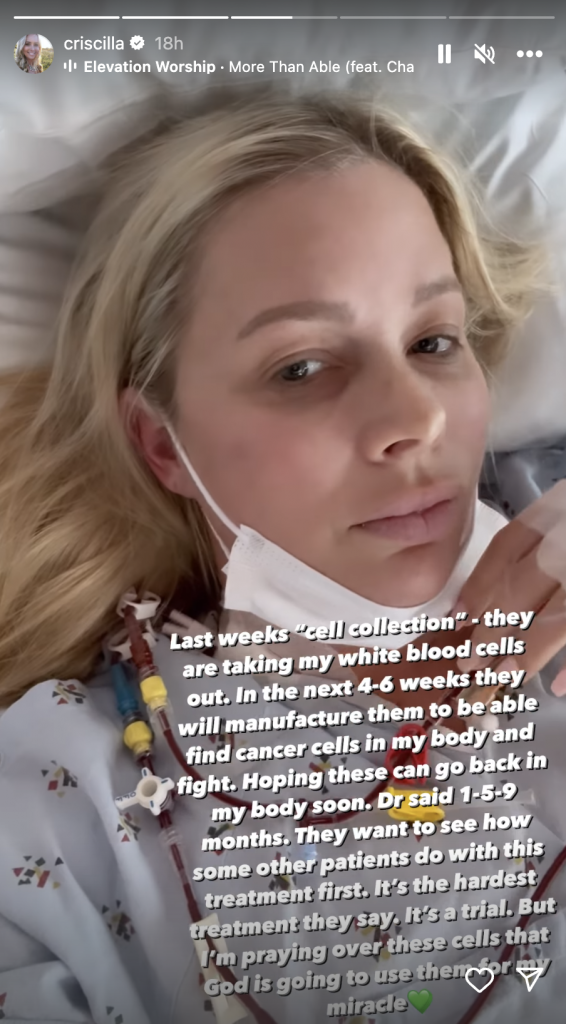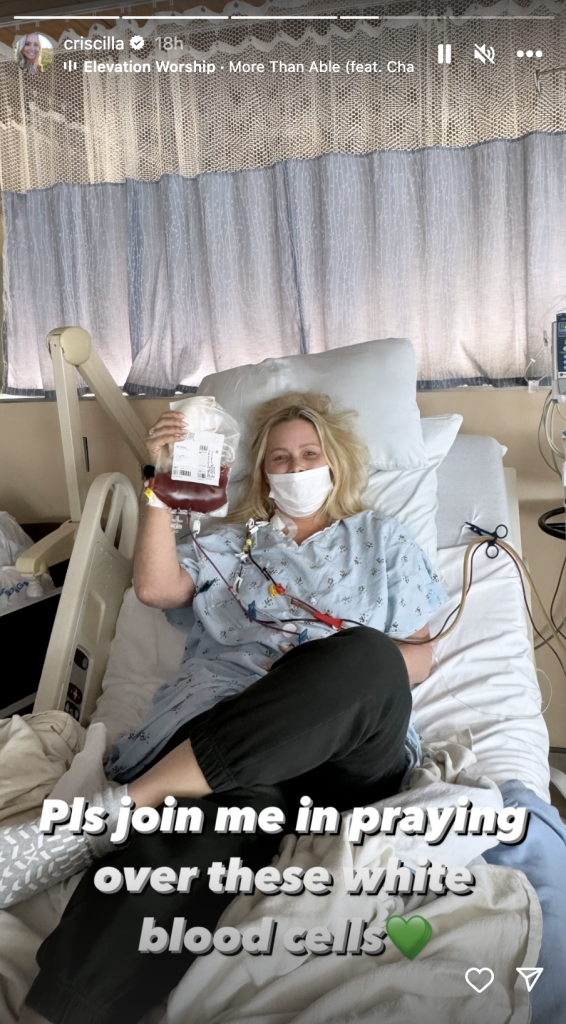Placing Hope in Clinical Trials
- A-list choreographer Criscilla Anderson, 42, has turned to a trial in Germany to help fight stage 4 colon cancer and is praying for a breakthrough — though details are unclear as to whether or not this is a clinical trial.
- In the past, the wife and mom of four, who was diagnosed in 2018, has tried many alternative treatments, which are unproven treatments that medical experts strongly advise against. While cancer is a very personal journey that consists of many personal decisions, it is important to know the difference between science-backed trials and other therapies that are preying on false hope (sometimes for a hefty price tag).
- Generally speaking, SurvivorNet’s medical experts suggest speaking with your doctor before enlisting in a scientifically structured and government approved clinical trial, as there may be other factors involved you may not be aware of, and they can help guide you along the way.
- If participating in a clinical trial is something you think you may be interested in, and you would like to start doing your own research, the government has a list of trials that are currently ongoing. SurvivorNet also has a tool to help you find trials for your particular disease. But again, be sure to go through these options with your doctor to weigh the pros and cons for your specific medical situation.
On Wednesday, Criscilla — who has danced for stars such as Rihanna and Britney Spears — shared updates on her Instagram Stories about the treatment, though more specific details about this trial, and whether or not it is a clinical trial, are unclear.
Read More“They want to see how some other patients do with this treatment first. It’s the hardest treatment they say,” she added of the trial, which appears to be a type of cellular immunotherapy. “I’m praying over these cells that God is going to use them for my miracle.”

“Please join me in praying over these white blood cells,” Criscilla wrote in another post, grinning from behind her mask while holding up her blood bag from her hospital bed. She doesn’t offer any more details of her trip, as Criscilla has been focusing on mostly sharing lighter moments with her children on her main feed opposed to constant health updates.

Like many people going through cancer, the devoted mom has often expressed turning to prayer for comfort throughout her nearly 6-year-battle, and has credited her family and “village” of supporters to keeping her spirits up throughout this incredibly difficult time in her life.
Criscilla’s Cancer Journey
Three years after Criscilla’s initial stage 4 diagnosis in 2018, she remarkably showed no evidence of disease (NED) in 2021, but the cancer unfortunately came back in early 2022. With stage 4 cancer colon cancer, it is not curable, but is possible to manage it as a disease. The goal is to improve the quality of life as much as possible while keeping the cancer at bay.
Criscilla, who is the wife of country star Coffey Anderson, expressed early on in her journey that eastern medicine and natural holistic approaches are just as important to her as western medicine and chemotherapy.

There’s a difference between strictly relying on holistic treatments (which medical experts are vehemently opposed to) vs. undergoing chemotherapy, which is why using a mix of treatments is considered “complementary.” But many of these holistic treatments are charging a lot of money (and not covered by insurance), promising results that they shouldn’t. So unless it’s something complementary to your medical treatment plan that your doctor approves, holistic measures are by all means not a “cure” on their own.
In 2020, Criscilla raised over $90,000 to see cellular biologist Dr. Raymond Hilu in Marbella, Spain in 2020, and has frequently gone down to Mexico for alternative therapies, all of which have not worked.
Still actively fighting her disease, hopefully the trial in Germany is legitimate and will be successful for her, as we are always rooting for Criscilla.
Criscilla’s Fighting Spirit
Ever since her diagnosis, Criscilla has warmed the hearts of fans with her zest for life and energy as she takes on this unfair disease. The spirited dancer and actress has coached and performed with the Dallas Cowboy Cheerleaders amid her chemotherapy treatments, and most recently in May, performed with the legendary Dolly Parton and country star Keith Urban at the American Country Music Awards.
View this post on Instagram
Coffey Anderson, 45, who Criscilla has said has been a rock for her and their kids, jokingly referred to himself as a “trophy husband,” proudly sharing his wife’s professional accomplishments on Instagram.
Coffey is always rooting for his wife throughout her health journey as well, and has been showing some behind the scenes moments of life at home with his kids while his wife is away.
Learning About Clinical Trials
As we noted, it is unclear which trial that Criscilla is participating in, and whether or not it is official, but we wanted to take the opportunity to explain the process of clinical trials.
Researchers use clinical trials to test new strategies, treatments or devices to find out if they are safe and effective. Clinical trials may be appropriate for some people depending on a variety of factors, such as the stage and type of disease, and it’s always worth checking with your oncologist to see whether you are eligible.
Considerations include the specific characteristics and stage of your cancer and your medical history (including past treatments for cancer), as well as the potential risks and benefits of this trial in your specific case. The National Cancer Institute lists all cancer trials here.
RELATED: SurvivorNet’s Guide to Clinical Trials: What Are They and Are They Right for You?
In a previous interview with SurvivorNet, oncologist Dr. Leena Gandhi, an immuno-oncology pioneer and chief medical officer at NextPoint Therapeutics, formerly of Dana-Farber Institute, explained discussing clinical trials with her patients and encouraged speaking with your own doctor about your options.
“Ideally, your doctor should be able to give you information about what he or she thinks is a good potential clinical trial option,” Dr. Gandhi said, noting that your doctor should also help “navigate options that you come in with.”
When Should I Consider Clinical Trials?
When Dr. Gandhi has patients come in asking about going to different locales to get on certain trials, she will help assess the specific trial and manage a patient’s expectations.
“And because my background is in this, I can say, you know, ‘This trial is almost just a tweak from what is normal. It’s not going to be a fundamental difference from what you’re going to get.’ Or, ‘This is something really novel but it’s totally unknown,’ or ‘This is something really novel but has a potential for you because of X, Y, and Z.”
Be aware that there are currently a number of factors that might exclude you from a clinical trial. These include being younger than 18, having HIV or organ dysfunction or having cancer that has metastasized to the brain. Efforts are currently underway to eliminate or modify these exclusions.
Clinical Trials: Things to Consider
In the U.S., all new drugs have to go through clinical trials before the FDA will approve them. In addition to being potentially live-saving for patients, these trials are also necessary to advance science and cancer treatments.
However, participating in a trial comes with risks as well, and it’s important to talk to your doctor about this before getting involved in one. Some risks to consider are:
- The risk of harm and/or side effects due to experimental treatments
- Researchers may be unaware of some potential side effects for experimental treatments
- The treatment may not work for you, even if it has worked for others
Still, joining a clinical trial comes with benefits as well. You will be given access to treatments that could be life-saving, but simply haven’t made it through the approval process yet.
Do You Have to Pay for a Clinical Trial?
Most of the time, when a person takes part in a clinical trial, the study’s sponsor pays for the treatment and any additional care (like extra doctor visits) that may be required during the trial. Some sponsors even pay for travel to and from appointments or treatment centers. Patients should make sure they ask what exactly will be paid for before signing up to be part of a trial.
The Affordable Care Act also mandates that health insurance companies pay for routine patient care costs while people are enrolled in clinical trials. This means that any care that would normally be covered for a cancer patient is still paid for throughout the trial, according to the American Cancer Society.
Who Can Sign Up for Clinical Trials?
If you’re interested in taking part in a clinical trial, the first thing to do is to speak to your doctor about the possibility of a trial. Blindly searching trials on the internet might not be the best advice available; using either the government’s clinical trials database or SurvivorNet’s resources specifically for cancer patients is your best option.
Beware of Alternative Therapies
The trend of “holistic” medicine has gained significant ground over recent years, with millions of Americans turning to alternative treatments rather than standard treatment. However, this can be extremely dangerous and life-threatening. A Yale study, published by JAMA Oncology, found that people who pursue alternative therapy are more likely to die. Since this has become a popular route, more oncologists are incorporating integrative medicine into their practices without replacing standard treatment such as chemotherapy.
Unlike alternative medicine, which claims cancer can be “cured” or completely prevented, integrative medicine blends both standard treatment as well as emphasizing lifestyle behavior. This can include diet, exercise, and a person’s overall well-being.
“Integrative medicine is an approach to care that puts the patient in the center of care and everything flows from that,” Dr. Brian Berman, director of the Center for Integrative Medicine at the University of Maryland School of Medicine, previously told SurvivorNet.
“It emphasizes lifestyle behavior, like diet, stress management, nutrition, and it also blends the best of conventional medicine and complementary therapies. It very much believes in the power of conventional medicine, but it’s trying to bring in other evidence-based approaches, and to optimize people’s health and well-being.”
‘A Lot of People are Selling Hope,’ says leading oncologist
While supplements can be beneficial in regulated doses, and under certain circumstances, it’s important to note that they are not a substitute for cancer treatment, prevention, or reducing the risk of cancer recurrence. In order to have the most successful outcomes, it’s key to follow your physician’s advice and stick to evidence-based treatment options.
Dr. Ann Partridge, an oncologist at Dana-Farber Cancer Institute, previously told SurvivorNet that she has “two major concerns” when someone’s “putting something into their body.”
“One is that it might interact with something that I’m recommending as an oncologist to treat the cancer and might get in the way of that working or might increase the side effects they have from treatment,” Dr. Partridge said.
“The second big thing is that, understandably, some of these therapies are much more appealing than some of our standard therapies in the general medical world, like chemotherapy or surgery. Wouldn’t it be much nicer to take a vitamin and treat your cancer? So the studies have not been done in the rigorous way that we do cancer treatment trials to tell us for sure that that’s not harmful.”
Learn more about SurvivorNet's rigorous medical review process.

